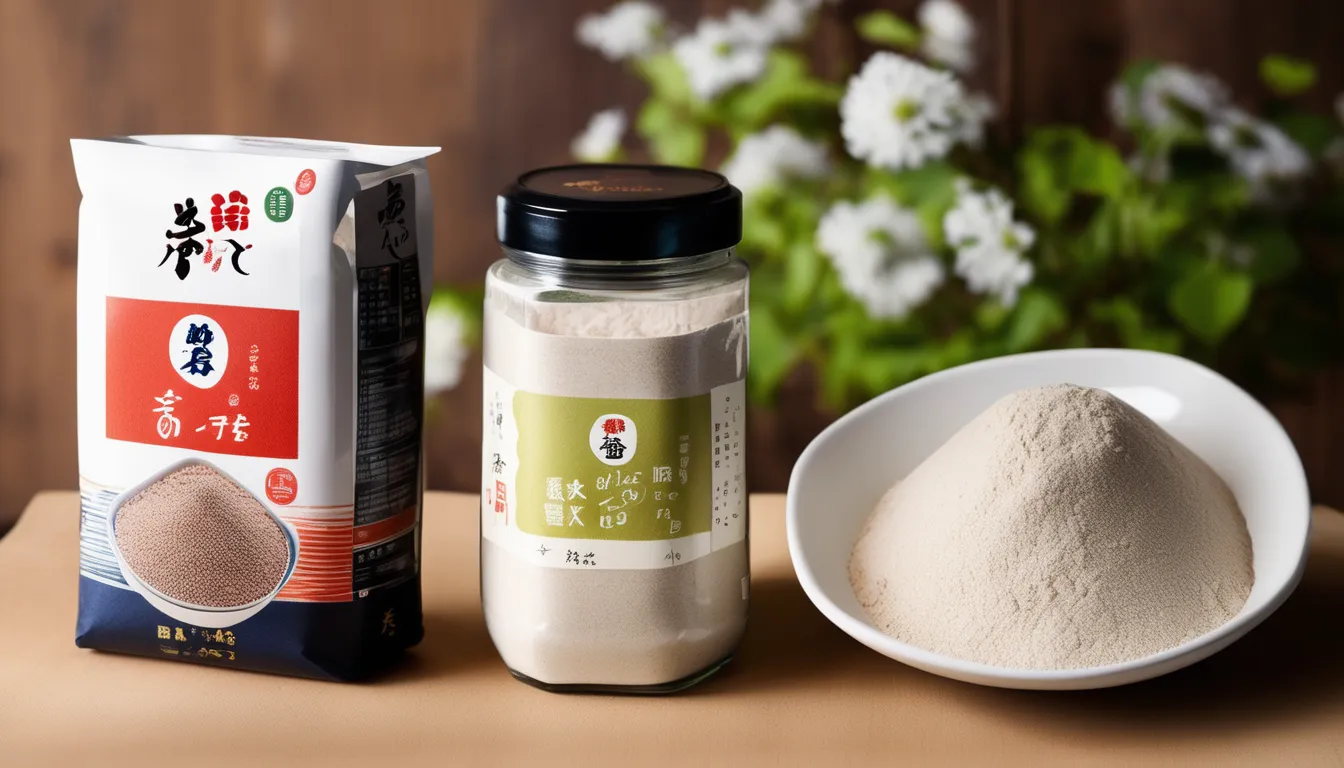When considering the efficacy of detox diets, the inclusion of buckwheat flour is a topic that warrants attention. Its unique nutritional profile holds promise in supporting various aspects of the body’s detoxification mechanisms. By exploring the specific ways in which buckwheat flour interacts with the body during a detox regimen, you will uncover a deeper understanding of its potential impact on your overall well-being. The intricate relationship between buckwheat flour and detox diets may surprise you with its multifaceted benefits, providing a compelling reason to explore this connection further.
Nutritional Benefits of Buckwheat Flour
If you’re looking to boost your nutrient intake, buckwheat flour is a fantastic choice. This gluten-free flour is packed with essential vitamins and minerals that can enhance your overall health.
Buckwheat flour is a good source of fiber, which aids in digestion and helps you feel full longer. It also contains high levels of protein, making it an excellent option for those following a plant-based diet or looking to increase their protein intake.
Additionally, buckwheat flour is rich in antioxidants, particularly rutin, which can help protect your cells from damage caused by free radicals. These antioxidants have anti-inflammatory properties, which can benefit your heart health and reduce the risk of chronic diseases.
Buckwheat flour is also a good source of iron, magnesium, and B vitamins, all of which play crucial roles in various bodily functions.
Incorporating buckwheat flour into your diet can provide a nutrient boost and contribute to your overall well-being. Whether you use it in baking, cooking, or as a thickening agent, this versatile flour can be a valuable addition to your pantry.
Detoxification Support Through Buckwheat Flour
With its array of nutrients and health benefits, buckwheat flour also plays a supportive role in detoxification diets. Buckwheat contains compounds like rutin, which acts as an antioxidant and helps in the removal of toxins from the body.
The fiber content in buckwheat aids in promoting regular bowel movements, which is essential for eliminating waste and toxins efficiently.
Moreover, buckwheat is a good source of protein, making it a valuable addition to detox diets as it supports the body’s natural detoxification processes. The amino acids in buckwheat assist in liver function, which is crucial for detoxifying the body.
Including buckwheat flour in your detox diet can help in reducing inflammation and supporting overall gut health.
Incorporating そば粉 通販 into detox recipes like pancakes, muffins, or noodles can make the process more enjoyable while providing you with the necessary nutrients to support your body’s detoxification journey. Remember to drink plenty of water to aid in the flushing out of toxins during your detox regimen.
Digestive Health Promotion With Buckwheat Flour
To enhance your digestive health, incorporating buckwheat flour into your diet can be a beneficial choice. Buckwheat flour is a rich source of dietary fiber, which plays a crucial role in maintaining a healthy digestive system. Fiber helps regulate bowel movements, prevents constipation, and supports the growth of beneficial gut bacteria. By adding buckwheat flour to your meals, you can increase your fiber intake and promote better digestion.
Moreover, buckwheat flour contains compounds like resistant starch and polyphenols that have been linked to improved digestive health. Resistant starch acts as a prebiotic, feeding the good bacteria in your gut and promoting a balanced microbiome. Polyphenols, on the other hand, have antioxidant properties that can help reduce inflammation in the digestive tract.
Incorporating buckwheat flour into your diet can aid in maintaining regularity, supporting gut health, and enhancing overall digestion. Whether used in baking recipes, as a thickening agent, or as a gluten-free alternative, buckwheat flour offers a versatile and nutritious option for promoting digestive wellness.
Liver Cleansing Properties of Buckwheat Flour
Occasionally overlooked but significant, the liver cleansing properties of buckwheat flour can play a pivotal role in supporting your body’s detoxification processes. Buckwheat contains compounds like rutin and quercetin that support liver function by aiding in the elimination of toxins and promoting overall liver health. These properties make buckwheat flour a valuable ingredient in detox diets aimed at enhancing liver function and promoting overall well-being.
To highlight the liver cleansing properties of buckwheat flour, consider the following table:
| Liver Cleansing Properties of Buckwheat Flour | Benefits |
|---|---|
| Rich in Rutin and Quercetin | Supports liver detoxification processes |
| High in Antioxidants | Helps protect liver cells from damage |
| Excellent Source of Fiber | Promotes healthy digestion and regular bowel movements |
Incorporating Buckwheat Flour Into Detox Recipes
Often underestimated yet incredibly versatile, buckwheat flour can be seamlessly integrated into a variety of detox recipes to enhance the nutritional value and detoxification benefits of your meals.
Use buckwheat flour in smoothies for a boost of fiber and antioxidants. Try incorporating it into pancake or waffle batter for a nutritious breakfast option.
You can also use buckwheat flour in baking recipes to make healthy treats like muffins or cookies. For a savory twist, use it as a coating for baked vegetables or tofu.
Buckwheat flour can also be used to thicken soups, stews, and sauces while adding a nutty flavor profile. Experiment with different recipes to find creative ways to include buckwheat flour in your detox diet.
Frequently Asked Questions
Can Buckwheat Flour Cause Allergic Reactions in Some Individuals?
Yes, buckwheat flour can cause allergic reactions in some individuals. Always check labels and consult a healthcare provider if you suspect an allergy. It’s essential to be cautious and aware of potential allergens.
Is Buckwheat Flour Safe for Individuals With Gluten Sensitivities?
Yes, buckwheat flour is safe for individuals with gluten sensitivities. It is naturally gluten-free and can be a great alternative in recipes. Just be mindful of cross-contamination if you have severe gluten allergies.
How Should Buckwheat Flour Be Stored for Optimal Freshness?
To keep buckwheat flour fresh, store it in an airtight container in a cool, dry place. Avoid exposure to heat and moisture. Remember to seal it tightly after each use to maintain its quality and extend its shelf life.
Are There Any Potential Side Effects of Consuming Buckwheat Flour?
When consuming buckwheat flour, be mindful of potential side effects like digestive issues or allergic reactions. Always monitor your body’s response and consult a healthcare professional if you experience any adverse symptoms.
Can Buckwheat Flour Be Used in Baking as a 1:1 Substitute for Regular Flour?
Yes, buckwheat flour can be used as a 1:1 substitute for regular flour in baking. It adds a nutty flavor and a nutritional boost to your recipes. Experiment with it in pancakes, muffins, and cookies for a tasty twist.
Conclusion
In conclusion, buckwheat flour is a versatile and nutritious ingredient that can greatly benefit detox diets. From supporting liver function to promoting digestive health, its unique properties make it a valuable addition to detox recipes. By incorporating buckwheat flour into your meals, you can enhance your body’s natural detoxification processes and improve overall well-being. Give it a try and experience the positive impact it can have on your health.






